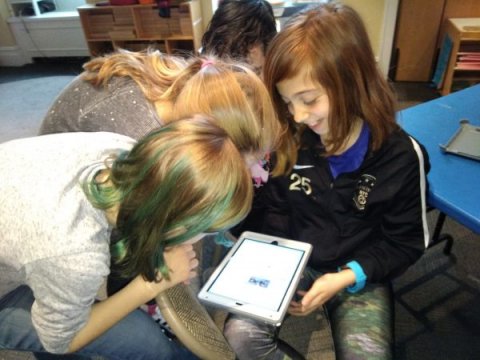Building a Professional Learning Community to Unlock the Power of EdTech

A laptop and two MP3 players will get you only so far. That’s what we realized a few years ago as our school, Brooklyn Heights Synagogue Religious School, (BHS) under the leadership of Rabbi Molly Kane, set out to shift our pedagogical approach to student centered learning. We acknowledged powerful education is connected to our students’ lives and that, to be impactful, Jewish education must find ways to emphasize that connectedness. We saw technology was how our students connected to each other and the world. We realized we were limited by the tools and techniques we had at our command. Knowing that technology tools with teacher training had significant potential to support the connected, student-centered learning we sought, we began to explore how these new tools could help us better reach students while remaining true to our core philosophy of intentional community building amongst our students and staff.
A grant from The Jewish Education Project and UJA-Federation of New York jump started our experiment with technology, allowing us to purchase several tablets. We soon recognized that neither I nor my young staff had the skills to integrate the technology to truly change our instructional practice. The Jewish Education Project supported our efforts with a second grant to fund professional development. I also participated in The The Jewish Education Project’s Digital Learning Network where Jewish educators have ongoing conversations about the successes and challenges of integrating technology. From here, BHS began a collaboration with education consultant Mindy Gold.
Outside the network space, we began planning a professional development series customized to meet BHS’s goals for teachers and students. This included maximizing the impact of technology to increase collaboration, creativity, communication, and critical thinking within our community of teachers as well as between the students. The structure of the professional development was intentionally both ongoing and collaborative over time: two key ingredients to effective professional development. It followed the arc of skill acquisition: learn about it, experience it, reflect on the experience, use the skill with coaching, reflect with the coach, and then use the skill independently.
The training took two forms: meetings and curated online resources. The first virtual meeting between Mindy, myself and our 4th and 5th grade teachers combined an introduction to technology integration theory, Jewish text study focused on values that foster community building, opportunities to experiment with a variety of technology tools, and elements of effective pedagogy that were supported, not usurped, by the technology. We followed with an on-site lesson study cycle. We observed Mindy using these same tools in action during a session with our 4th and 5th graders with texts focused on themes of community and respect in both face-to-face and digital spaces. We discussed our observations of this lesson as a basis for writing our own integrated lesson plans. In our subsequent virtual meetings, Mindy used a variety of coaching strategies to foster reflection and encourage peer collaboration. Mindy also created an online resource which included “think alouds” to model and focus our planning. These were paired with a collaborative “coaching conversation document” using Google Docs where we could continue to reflect on challenges, successes, and our progress toward student and educator goals.
Josh Gischner, 4th grade teacher, summed up the experience this way:
I found that although sometimes frustrating, properly implementing the technology into our end of the year project was extremely successful due to Mindy’s teaching. Beyond the use of apps which she suggested and her lessons on using various technologies in the classroom, I found that having a Jewish technology educator to bounce ideas off of was super helpful. Brainstorming between Mindy, [fellow teachers], and myself was one of the most helpful elements of this project…. in implementing our final goals.
The final goal was crafting an opportunity for students to reflect on their year of learning. Students used technology to create multimedia text studies on life cycle events or presentations on Jewish history. The technology tools enabled students to share their work with the larger BHS community, including parents, who could then contribute their own comments.
This professional development model was successful due to its multi-faceted approach:
- The focus was on the learning and how technology could support it, not the tools.
- Teachers saw themselves and their director as resources, supporting one another throughout the process.
- Ongoing conversations with each other and the consultant coach provided a safe learning space for experimentation and risk-taking.
- Text study on community and respectful use of technology set a tone for collaboration and community building.
We observed the following outcomes:
- The technology tools focused students’ text study, helped students organize their resources and thinking, and added a new opportunity for creativity that was not possible with non-digital tools.
- Students responded with excitement to the newly designed learning, including those students who had been reluctant to engage with Jewish learning previously. They showed pride in what they saw as significant work product.
- Teachers learned both a theoretical (why) and practical (how) approach to using technology tools in their classrooms.
- Teachers are looking to share what they learned with other faculty in the upcoming school year.
We found that the challenges facing BHS, along with our goals of building community amongst staff and students, could be met by thoughtfully harnessing technology. That achievement necessitated multi-faceted professional development and the building of a learning community. This combination created the foundation for the powerful learning we are looking for as we continue to adjust our instructional practice for student-centered learning.
Jessica Braginsky is the Principal of the Brooklyn Heights Synagogue Religious School. Mindy Gold is founder and lead consultant at EdtechMMG, an education technology consulting firm.
This post was first published by eJewish Philanthropy and is shared with permission.
